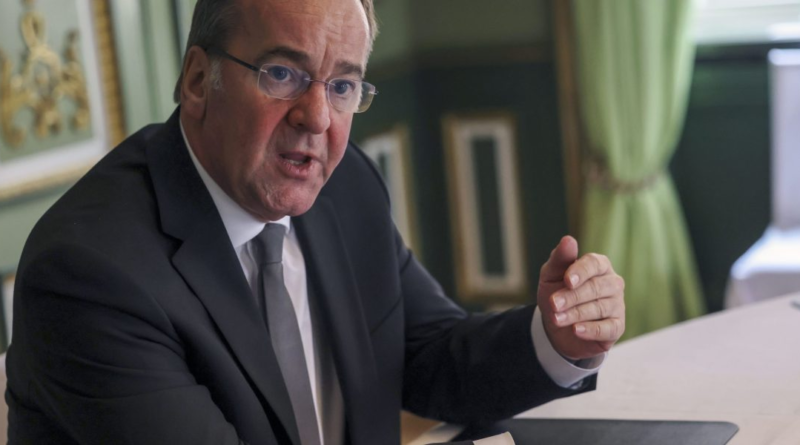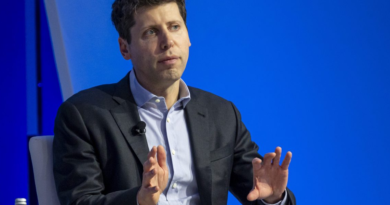Failure to back Ukraine aid could hurt US economy and defense contractors, says Germany
German Defense Minister Boris Pistorius urged US lawmakers to approve additional military aid for Ukraine stalled in Congress, warning that failure to do so could damage America’s economic interests.
As well as potentially hindering security cooperation and harming US defense contractors, Kremlin aggression if left unchallenged could also weaken Europe more broadly and disrupt the bloc’s trading relationship with the world’s biggest economy, Pistorius said in an interview Saturday at the Munich Security Conference.
“One aspect among many others of our transatlantic cooperation is that we signed hundreds of contracts worth billions of dollars and we are about to prepare new contracts,” he added. “It’s obvious that the alliance for security brings many advantages — for both sides.”
German Chancellor Olaf Scholz and other western leaders have mostly focused on political and strategic arguments in justifying their calls for additional US military aid for Ukraine.
Now Pistorius — a member of Scholz’s Social Democratic Party — is striking a different tone by highlighting potential pain for America’s defense contractors if more US support fails to materialize.
Germany is increasingly concerned about such a scenario. Attempts to unlock the latest aid package worth more than $60 billion have been stuck for months, prompting increasingly urgent appeals from Ukrainian President Volodymyr Zelenskiy as supplies of ammunition and other materiel dwindle.
Those concerns were fueled by comments last week from former US President Donald Trump, who questioned the nation’s commitment to defend NATO allies.
President Joe Biden on Saturday blamed lawmakers’ failure to approve the aid package for the fall of Avdiivka, which handed Russia a significant victory after months of fighting over the eastern city.
Germany is ramping up defense spending following Russia’s full-scale invasion of Ukraine and a significant proportion of the investments from a debt-financed €100 billion ($108 billion) special fund are flowing to the US defense industry.
Among a raft of orders worth some €30 billion, Scholz’s government has earmarked €10 billion for 35 F-35A Lightning fighter jets manufactured by Lockheed Martin Corp. and is also buying 60 Chinook helicopters from Boeing Co. for about €8 billion.
Pistorius warned of the consequences of a Ukrainian defeat, not only for Europe but also for the US, saying Russian President Vladimir Putin’s invasion was a threat to the “rules-based international order.”
“Geographically, Europe is far away from Iowa or Wisconsin, but still it’s very close in terms of security policy,” he told Bloomberg. “Less security in Europe means less security for the United States,” he added. “We shouldn’t take freedom for granted. We have to defend it. We have to fight for it if necessary.”
Germany has been pushing its European neighbors to deliver more weapons to Ukraine and Pistorius said that he has seen evidence of commitments picking up.
“The UK is also doing more and more and also France is increasing its support,” he said. “I’m absolutely confident that we will be able to achieve a lot of support during the months and years to come. But of course it’s not easy. Money is not limitless.”
French president Emmanuel Macron on Friday pledged additional assistance worth as much as €3 billion for this year after signing a bilateral security agreement with Zelenskiy in Paris.
Earlier in the day, Zelenskiy had signed a similar agreement in Berlin, where Scholz unveiled a new €1.1 billion package of air-defense and artillery systems, part of total a German commitment of around €28 billion.
Pistorius told delegates in Munich on Saturday that a commitment by NATO members to spend at least 2% of economic output on defense “can only be the starting point” and European nations need more capable armed forces as they expand their engagement around the globe.
After hitting the target this year for the first time, Germany could even increase military spending to as much as 3.5% of GDP, depending on “what’s happening in the world and in our economy,” Pistorius said during a panel discussion. He cautioned that budget constraints mean it will be challenging to find the money once the special fund is exhausted after 2027.
German defense contractors are also benefiting from the surge in government spending. Scholz and Pistorius last week took part in a groundbreaking ceremony for an expanded Rheinmetall AG ammunition facility in Unterluess in Lower Saxony.
“I consider it a remarkable and almost historic achievement of our government that Germany is now the biggest supporter of Ukraine after the USA,” Rheinmetall Chief Executive Officer Armin Papperger said at the event. “ Our country has thus assumed the leading role in Europe that many have always called for.”
In the Bloomberg interview Saturday, Pistorius urged Europe and the NATO defense alliance to prepare for “the worst case scenario.”
“I don’t like to look into the crystal ball,” he said. “I can’t predict if and when an attack on NATO territory might occur. But it could happen in five to eight years.”
— With assistance from Laura Alviz




